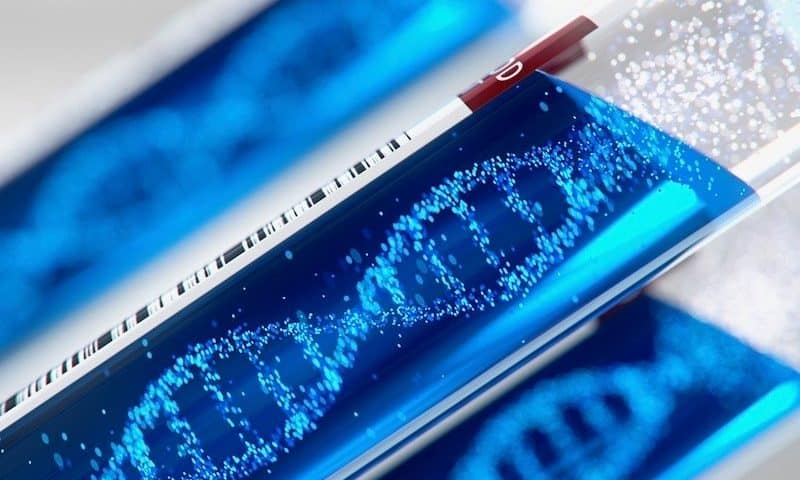Pacific Biosciences will work with machine learning researchers at Google to bolster the accuracy of its DNA sequencing hardware.
It’s not the companies’ first collaboration. Pre-published work from last year showed Google’s artificial intelligence tools could increase the yields of PacBio’s long-read sequencing, already 99.9% accurate in some cases, by another 27% per instrument run.
“Traditionally, Google has been doing a lot of work on deep variants and looking at interpretation and back-end processing,” PacBio’s chief operating officer, Mark Van Oene, said during the company’s presentation at the J.P. Morgan Healthcare Conference. “This time, we’re having them focus on our raw base accuracy.
“Something as small as a 2% increase in raw base accuracy with our traces could lead to a 20% increase in yield,” Van Oene said. “The goal here is to get them inside the system.”
The plan is to integrate Google’s deep learning tech into PacBio’s future products, specifically aimed at sharpening the hardware’s abilities in both whole genome and targeted sequencing applications.
“The more we can improve that accuracy, the more we will be able to drive down costs, increase throughput and help our customers resolve important biology,” said PacBio President and CEO Christian Henry.
Meanwhile at the conference, PacBio announced a pilot project with Genomics England to sequence biobanked samples from patients with rare diseases using the company’s HiFi technology.
The collaboration will reanalyze samples that had their DNA previously read by short-read sequencers—through the organization’s 100,000 Genomes Project—to see whether PacBio’s long-read machines can give a clearer picture of the patient’s genome and identify any additional clinically relevant mutations.
“The 100,000 Genomes Project was able to find actionable mutations in around 25% of patients with rare disease,” Parker Moss, Genomics England’s chief ecosystem and partnership officer, said in a statement. “We are excited to discover whether new technologies like PacBio’s HiFi can identify additional genomic variants in regions of the genome that are not readily accessible by short-read sequencing technologies.”
PacBio’s Henry also responded to announcements earlier in the conference from the company’s main DNA sequencing competitor—and one-time suitor—Illumina about its plans to add longer-read capabilities to its currently installed base of short-read machines.
Code-named Infinity, Illumina’s upcoming library prep system will alter samples with the goal of delivering contiguous data up to 10 kilobase pairs in length. The aim is to help sequence the remaining sections of the human genome that have posed obstacles to the company’s hardware in the past.
It’s a daunting move, with Illumina commanding about 75% of the global DNA market and an installed base of at least 20,000 machines among its more than 8,000 customers—none of whom would have to purchase new sequencers to upgrade the read length of their current hardware. The news sent PacBio’s stock down about 15% the morning after the announcement.
“The challenge with this approach is that it’s been tried several times and never really gained any traction, so it will be interesting to see how well it does,” Henry said. “The applications are probably more in bacteriology and some of those smaller genomes.”
“You’re still fragmenting the DNA, and you’re still losing information that you couldn’t get,” he said, comparing it to PacBio’s sequencer reads that average between 10 and 25 kilobase pairs. “There’s some real limitations to what stitched short reads can do, but it demonstrates the fact that competitors believe that long reads are important.”
Henry also delivered a preliminary look at the company’s 2021 financial report, which he described as the most productive year in PacBio’s history.
Product and service revenues estimated for 2021 came in at about $130.5 million, equaling 65% year-over-year growth compared to 2020’s $78.9 million and far outpacing 2019’s $90.9 million.
Those numbers stem from an 84% increase in the company’s installed base of machines and 250% growth in the petabytes of data generated by researchers using PacBio hardware globally.
Looking forward, PacBio also announced a deal with Beijing-based Berry Genomics to develop its first small, tabletop-sized sequencing system, bound for the clinical market in China.
Berry Genomics will purchase at least 50 instruments at launch to expand its own footprint in perinatal and carrier testing and will also sell the instrument and consumables within the country. Berry Genomics previously supported the national regulatory authorization of PacBio’s Sequel II instrument in 2019.

